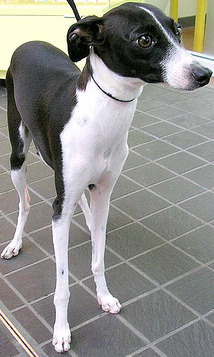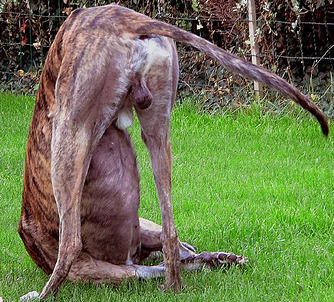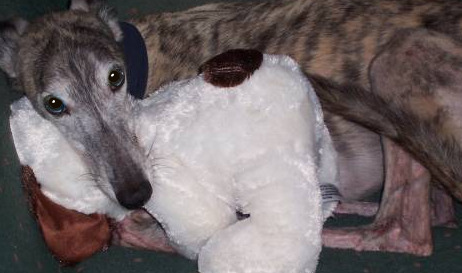|
Greyhound Dog AdoptionGreyhound dog adoption is another option for dog adoption! Have you seen these dogs run? They're fast - running up to 45 miles per hour! The racing greyhound, pound for pound, is over 10 times faster than a Thoroughbred racehorse! Wow! After retirement, however; they make excellent house pets. I know a couple that adopted two Greyhounds and they are great dogs. My friends both work full time, but come home to their dogs and exercise them. The dogs are perfectly happy being home together during the day, and are excited to see their owners return to take them for a run. Once they've been exercised, though big - males weighing between 65 and 70 pounds, and females weighing between 60 and 65 pounds, standing between 26 and 30 inches at the shoulder - they are mild mannered and calm, and settle down nicely in their home. When racing greyhounds are no longer able to race because they are no longer considered winners, or if they've sustained an injury that prohibits them from racing, the racing kennels often try to adopt out these dogs, but sadly many of these dogs are destroyed. With this awareness, more and more agencies are committed to Greyhound dog adoption where they find loving homes for these gentle animals. These dogs, although having only lived around other dogs, and not with a single owner, do adapt to living as part of the human pack, either with an individual or a family. They are eager to please and quickly become quite attached to their new owner. Your loyal new friend will follow everywhere! Did you know that Greyhounds are known as "the world’s fastest/greatest couch-potato”? It's true! They sleep a lot. What else does a racer do when not racing? They sleep. These dogs are easy to care for as they simply need a time where they can go outside for their daily sprint and then are happy to go right back inside to a warm, soft bed. All Greyhounds are adopted out with the understanding that they are an indoor pet; they have thin skin, making soft bedding in a warm indoor environment a necessity. Greyhounds are not meant to be guard dogs. This particular breed barks a lot less than other breeds and has not been bred for this purpose. Look for another type of dog to adopt if you're looking for a watchdog. Greyhound Exercise Needs When Considering Greyhound Dog Adoption You would think that Greyhounds, being a breed that is bred to race - heck they make money racing! - would need an inordinate amount of exercise. Surprisingly, they need less less exercise that you might think. Greyhounds are primarily a sprinting breed, rather than an endurance one. They are happy with several good runs a week; they can be quite the couch potato, literally happy to lie on your couch the rest of the time! I always think of Greyhounds as racing dogs, but some Greyhounds are bred to "show." Racing Greyhounds are a little shorter and less heavy than show Greyhounds. A show Greyhound typically stands between 26 and 30 inches at the shoulder, and weighs 60 to 85 pounds.

Greyhound CharacteristicsWhen considering Greyhound dog adoption, what are some things to consider? Size, temperament, and activity level, right? The Greyhound is big, yes, but it's a mellow, sweet dog with a great temperament and although bred to race, it is a dog bred to "sprint", not for endurance, so can easily adapt to retirement in a home where the dog is well-loved and given minimal daily exercise. Greyhounds are very gentle and have a quiet disposition. They are very pack oriented dogs and will quickly adopt human masters into their “pack." Aggressiveness towards other dogs and people has been nearly eliminated through breeding. Many do retain a strong prey drive helpful in their racing career, so may not be suitable for houses with other small pets such as cats or rabbits. If you are strictly a dog person, this breed is one that would work well for you. These dogs are intelligent and gentle, and usually good around children. But, always remember, a dog is an animal; there is only so much they will endure from a tiresome toddler or child. Always get to know your dog well before leaving them alone with children. Greyhounds are considered "sighthounds," a group of hounds that pursue their prey by sight rather than scent. Their chase instinct is very highly developed, but they can learn to live with small animals such as cats. The Greyhound will adapt better to a cat that won't tempt your Greyhound to run, acting like prey, meaning they won't run from the Greyhound. And though they may not chase your own cat, it doesn’t mean they won't chase the neighbor’s cat, or a squirrel running along your fence. My dog Sydney lives with two cats and basically steers clear of them, doesn't chase other cats in the neighborhood, but will chase a squirrel or bunny. I even lived with a Pit Bull once who loved our cat, but would chase the other cats in the neighborhood. I can tell you, my cat thought he was pretty cool! All dogs have their own personalities, so though certain traits are common to certain breeds, you can't be sure how they'll react until they are in a given situation. Greyhound rescue agencies that take in retired Greyhounds test them around other dogs and cats to see if they're compatible with them. Some agencies then place them in suitable foster homes which teach the dogs socialization, housebreaking, and even simple tasks like climbing stairs.

Other considerations when thinking about Greyhound dog adoptionA race track has been a Greyhound's only surroundings from birth to their retirement at about four years of age, all normal sights and sounds such as traffic, children playing, a television, and any other thing we consider ordinary, are not for the Greyhound. They may be timid or frightened, and it will take some adjustment before the Greyhound is accustomed to its new home. You are taking on an animal that has been well cared for, but not socialized. This is how my dog, Sydney was. It took extra time and effort for her to bond to us and become social around other dogs. It has been well worth it. She is an awesome and loving pet. Because of their sheltered lives, most Greyhounds do not know how ordinary commands such as sit or stay. They do not know how to climb stairs, or do ordinary things like fetch and play games because they have never been taught. They are intelligent animals and can learn to do all of these things. Greyhounds are used to being around other Greyhounds, but not other types of dogs. They've never had to defend themselves so if attacked, may either run away or freeze. Having adopted other timid; possibly abused or simply not socialized animals, one cat in particular would not come out from under the couch for a full week after we took her home; it took her a full year before we could walk by her without her scurrying off, it is a great feeling when your pet finally trusts you. A Greyhound's skin is extremely sensitive so rough and tumble play with dogs, children, or even their adult owners should not happen. A metal choker should never be used. Instead use a choke type collar made from nylon webbing. Greyhounds chill easily due to their lean bodies and short hair. They need a coat for walks on chilly days! They also need soft and warm bedding. If you have other pets you should muzzle your Greyhound when you first bring him home until you are sure he won't try to eat your cat. Muzzles are also required if you plan to bring your dog to an organized playgroup with other Greyhounds. Their skin needs to be protected from playful nipping from the other dogs. Of particular importance when considering greyhound dog adoption, is their outdoor environment. Do you have a fenced yard? It would be helpful. Although you don't need to live somewhere that has a fence, it would be much more convenient when the Greyhound needs to be let out to use the potty. They need to be in an enclosed area or on a leash. It's much easier to have a fenced yard. Greyhounds from the track do not know what traffic is and may be easily distracted by the sights and sounds of it. Also, since they are trained to chase, you must not let them loose near traffic in case they catch sight of a small creature, such as the neighbor's cat or a squirrel as they are likely to quickly scurry off after it. You may have to potty train a full grown Greyhound because at the track they are kept in kennels and let out several times a day to relieve themselves. At first, you'll need to take your dog out on a regular basis until he learns to tell you that he needs to go. Because they are used to being alone at the track, being inactive for long periods while they are not racing, Greyhounds are able to adapt to you being away for extended times - so leaving him to go to work is an adjustment that can be made. It's good to have several days at home with your dog when you first adopt him so he can gradually adjust to you being away for longer periods. This is true with any newly adopted dog. They need to learn that you are not abandoning him. A Greyhound's life expectancy is 10 to 15 Years, and most Greyhounds that have raced retire at around age four, so plan on sharing your home with your adopted Greyhound for about six to nine years. You can find some volunteer agencies that provide Greyhound-sitting for very reasonable prices. This way when you're away overnight or on vacation you can feel good about leaving your dog with a trustworthy individual who understands the breed. You in turn can provide overnight care for other Greyhounds if that works for you. I always think it's a great idea to share pet sitting with a friend or neighbor, where you each take care of the others' dog when you're away. This way you don't have to board them. Be careful when your dog plays with another dog, as a Greyhound's skin is super sensitive and will nick easily. It's good to muzzle dogs during play as they do use their mouths!
Greyhound Cartoon on "Draw the Dog"You have to see this fabulous site called Draw the Dog. Here's a preview of what the site does! Visit Draw the Dog to see more Greyhound cartoons. Greyhound Dog Adoption CostsOnce a Greyhound is released from the race track to a rescue group or Greyhound dog adoption agency, the agency should provide all or most of the following for a typical fee of between $175 and $250:
You will be carefully screened by the adoption agency to ensure you are the right owner for Greyhound dog adoption. Don't be offended; just like any other animal adoption agency, the agency only has the best interest of the dog in mind and wants to make sure the potential adopter plans to give the dog a forever home. Returning an adopted dog does happen and just adds stress to an animal that is already going through a stressful time in his life.
Additional resources on Greyhound dog adoption and the Greyhound breedYou can learn more about Greyhound dog adoption at the National Greyhound Adoption Program. Here is a list of Greyhound dog adoption agencies in the United States, Canada, Australia, and Europe. 
The National Greyhound Association is the sole registry for racing Greyhounds on the North American continent. The American Kennel Organization: Greyhound is another good place to learn about the Greyhound breed. It's always fun to talk to others who share the same dog interests, so visit Grey Talk and ask questions, look at tons of pictures, and post your own, and discuss your Greyhound dog adoption options with others who have been through it. 
And if you're not quite ready for Greyhound dog adoption, perhaps you'd like to foster a Greyhound. Interested in your adopted Greyhound's racing statistics? See Greyhound Data which lists your dog's litter mates and descendants, his races and stats, tracks and racing courses. It provides information on Greyhounds throughout the world and stats on over 2 million races! I'd like to mention here that this website is not about Greyhound dog racing, it's about Greyhound dog adoption. I do not have a negative opinion about dog racing, believing that dogs that race enjoy it, and are well cared for, although I'm not keen on them being kenneled all day when they are not racing. I am no expert, however. I DO believe that once a Greyhound is retired from racing, every effort should be made to place them in a permanent home. Animal welfare groups do not believe in dog racing and have tried to have it banned in the United States. They have not been successful in any state that currently has dog racing. If you have concerns and want to learn more about the dog racing industry, I will refer you to The Greyhound Racing Association of America. No matter your belief, you may want to consider Greyhound dog adoption if you are looking for a sweet and gentle, easy to care for dog that needs a loving home. Return from Greyhound Dog Adoption to Choosing a Dog
|





